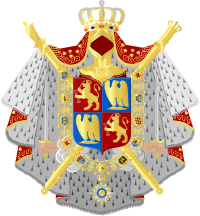Coat of arms of the Kingdom of Holland

The coat of arms of the Kingdom of Holland, a client state of Napoleon Bonaparte's French Empire which encompassed most of the modern-day state of the Netherlands, was instituted in 1806.
When the Emperor Napoleon proposed that his younger brother Louis Napoleon Bonaparte should become the king of a new kingdom, a state that would replace and succeed the age-old Dutch republic, at that time called the "Batavian Republic". He chose the name "Holland", after the most important province, as "Hollande" was much used in France as a name for the Netherlands.
The statute[1] described the royal arms and mentioned a royal crown. On 20 May 1807[2] a precise drawing of the royal coat of arms was approved by the king. The crown was topped with an orb with a cross.
In practice crowns without a cross became part of the crosses of Louis' Order of Knighthood, the Order of the Union, and the new coins. The second coat of arms, approved on 6 February 1806, showed no cross.

As the country was ruined by the Napoleonic wars and the resulting lack of trade there was no opportunity for a coronation. The crown existed on paper alone until the French annexed the country in 1810. In 1813 the Dutch "chose" a new sovereign ruler, later king, William I who had a new crown, the crown of the Netherlands designed and wrought in gilded silver.[3]
See also
References
- Hubert de Vries, "Wapens van de Nederlanden", Amsterdam 1995
- ^ Traktaat van Parijs van 24 mei 1805, artikel 9.
- ^ Decreet van 20 mei 1807, cited in Nahuys, Histoire Numismatique, 1858.
- ^ Hubert de Vries
